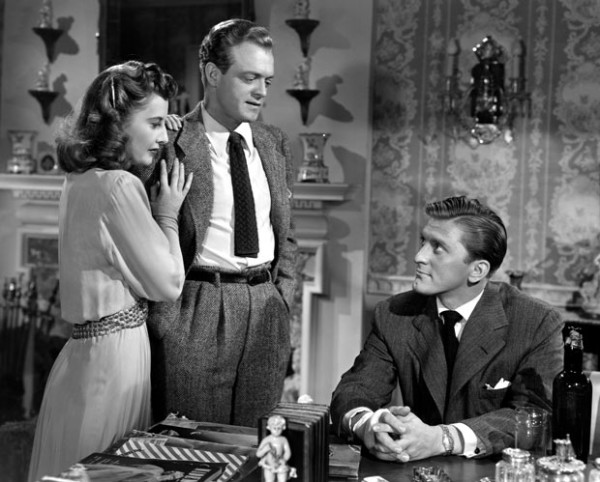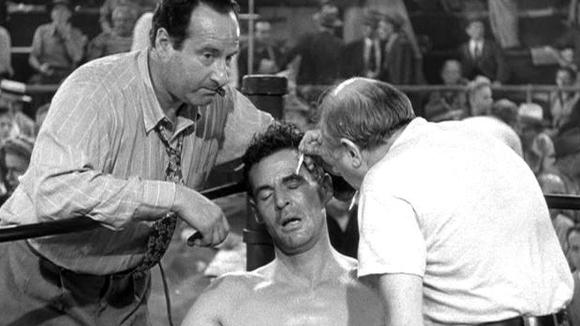The Strange Love of Martha Ivers (1946)

This is my first time seeing "Martha Ivers," a film I've heard about since childhood from my Dad, who was apparently hugely enamored of it as much as he mentioned it to me throughout my life. And the fact that I thought my Mom looked quite a bit like star Barbara Stanwyck might be a clue. Hmm. But he never said. Anyway, personal thoughts aside, I wish I'd gotten to this one sooner as it's a total winner in the Noir department. We start with three young pre-teens, two of them, Martha and Sam, trying to run away from Iverstown. Martha is caught and sent back to her Aunt (the great Judith Anderson, in a small role). A young boy, Walter, and his father, who works for the Aunt are there, and before the night is over, tragedy will strike. Sam awaits Martha at the trainyards to run away again, but she never shows.
We then see a grown Sam (now played by Van Heflin) driving along, not realizing that he is near to Iverstown, the home of his youth. Distracted by the town sign, he plows into a pole, damaging the front of his car. He takes it into town for repairs and goes for a walk around the old haunts. He meets an alluring young woman coming out of a bed-and-breakfast that used to be his home. The woman, Toni (the beautiful Lizabeth Scott), is vague about where she's heading, as is Sam, but they meet nicely, share a cigarette and soon part ways, each impressed by the other. It takes some time before we get to Martha (Stanwyck) and her now-husband, Walter (Kirk Douglas in his first film and doing a fine job). Martha now owns most of the town, and Walter is the local DA, although weak-willed and a man who loves his drink. When Sam meets them again, things appear chummy on the surface but we know it's not so. Walter starts using his DA job to snoop and interfere in Sam's life and Martha throws her power around to manipulate everyone to her advantage. It will take a strong-willed Sam to stand up to them. But how will this affect their one-time friendship, or was it ever a real friendship? And how will Toni fare, caught in the middle of this trio?
Directed by Lewis Milestone (All Quiet on the Western Front), this is a fine mystery-thriller, with things always just bubbling under the surface, with actions from one character or another causing those things to boil over, even if only for a bit, till they go back under and wait for the next eruption. Such as the build-up to Sam being set upon by a group of thugs, set up by someone he didn't expect. And then his waiting until he pays back a few of them or those responsible. Just an example of some of the great tension and goings-on that are a result of a man simply entering back into his old home-town. The resolution is one I wasn't sure was coming. I thought one end, sure, but this had several twists that left me more than satisfied that what I was seeing was film greatness. Douglas is fine in his first role. It's hard to believe he hadn't been on film before this, so good is he. Stanwyck is her usual lovely, but strong-willed self, a role she would play a variation on throughout her career, to great effect. But the surprise for me here is Helflin. I have only seen him in a handful of films, the main one being
Shane (1953), where he played a kind but strong homesteader. But still, I thought of him, partly based on that performance, as a man who would play good-natured guys all the time. Not so, if this film is any indication. When he first appeared onscreen, I thought I was seeing Arthur Kennedy, from his mannerisms and personality. But no, it's our man Heflin and he was badass all the way through. I need to see more of this type of acting from him. And lest I forget, Lizabeth Scott...what can I say? I fall for her everytime I see her in a film. And I've seen four or five of her films in the last couple of weeks and she's awesome everytime. With those lovely eyes and that low, husky voice, it's impossible not to love her. This is top-tier Film Noir and much recommended.






-photo.jpg)



